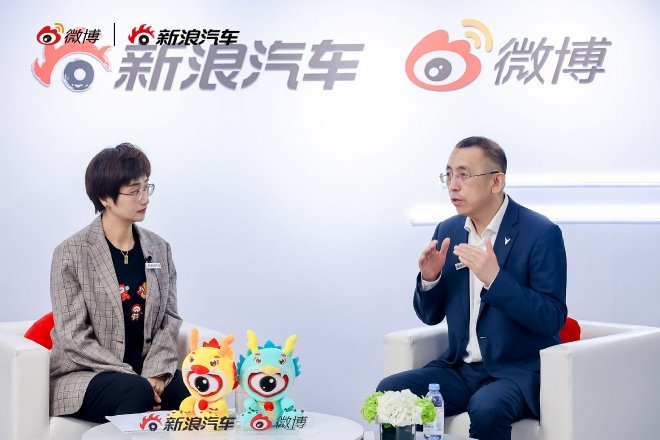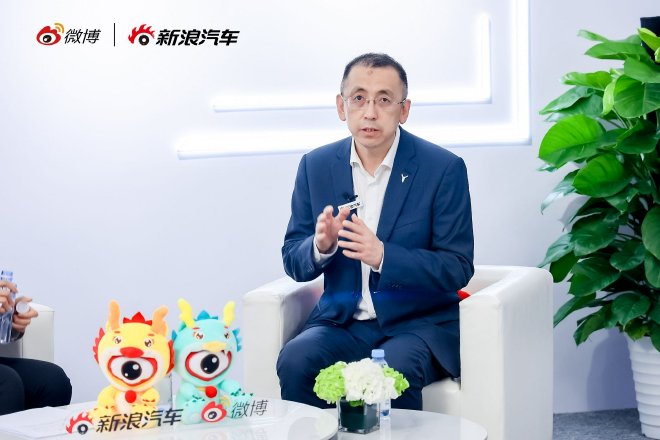On November 15, the 22nd Guangzhou International Auto Show officially opened. The auto market has entered a phase of stock competition. Chinese new energy vehicles, focused on electrification and intelligence, now drive high-quality development in the automotive industry. This year’s auto show continues with the theme “New Technology, New Life.” It serves as a barometer for the development of the Chinese auto market and collaborates with the global auto industry to usher in a new era. The show features 78 global debuts, including 6 from multinational companies. A total of 1,171 vehicles are on display, with 512 being new energy vehicles. Together, they showcase new technologies and innovations for the new era. In an exclusive interview with Sina Auto, Lu Fang, CEO of Lantu Automotive Technology Co., Ltd., stated that the overall decline in car prices results from technological advancements and management improvements. Lantu continuously lowers costs through technology and management. However, cost reduction must not compromise quality or the long-term sustainability of the entire industry chain. We do not oppose price wars, but we oppose reckless and principle-less price wars. Below is the transcript of the interview:
Chen Yao: Thank you, Mr. Lu, for joining our interview. Recently, many news reports highlight Lantu’s impressive sales. People believe Lantu is rising steadily and finally making its mark. Can you analyze why Lantu has performed so well in sales lately? Lu Fang: Lantu’s sales have indeed been climbing. We have achieved six consecutive increases, with sales exceeding ten thousand units for two straight months. Honestly, we recognize that this achievement is hard-earned. Why did we achieve this? I believe there are a few key points to consider. First, the users. Recently, Lantu launched many products. People often say Lantu’s products receive praise but lack sales. We engage with users, listen to their feedback, and quickly iterate our products. The first product we rapidly improved is the all-new Lantu Dreamer. We incorporated extensive user feedback and made numerous enhancements. Currently, this vehicle has become a phenomenal product in the industry. I want to emphasize that we listen to our users. Second, Lantu maintains strategic focus. We continue to invest in technology. We aim to innovate and provide users with better product experiences. Strong technology allows us to listen to users. When users provide input, we can implement it through technological means. I see this as a logical closed loop. Regardless, we focus on technology in areas such as three-electric systems, intelligence, vehicle foundations, chassis, and safety. We continuously improve our technology. We enhance it based on user suggestions. We iterate our products constantly. These two factors significantly boost our sales. Additionally, we transform our marketing approach. We align our sales closer to users. This shift goes beyond products. Our marketing now reflects user needs. We tailor our actions to gain user understanding. Thus, our marketing transformation plays a crucial role. Chen Yao: Lu Fang just analyzed three reasons for us. However, I want to ask about decision-making efficiency. No matter how good a strategy is, efficient decision-making is vital. I want to know if your decision-making efficiency has improved over the past few months or in our long-term operations, given our strong sales. Lu Fang: Our decision-making efficiency is relatively high. High efficiency does not always guarantee good outcomes. We must maintain our decision-making speed while improving quality. Internally, we focus on these improvements. We are undergoing changes in our internal systems. Our management is very flat. All our systems and processes are user-oriented. We are redesigning our internal development, manufacturing, quality, and marketing processes. We are making continuous attempts. Your follow-up question is excellent. We must focus on user-centric practices and ensure system support. Only then can we realize the concepts of users and technology. Chen Yao: Thank you, Lu Fang, for your insights. In today’s launch, you mentioned co-creation with users. We released a user co-creation ecosystem. Did we base this on successful previous product trials? We aim to promote it as a model. Lu Fang: You are absolutely right. We started exploring user co-creation in 2019. Back then, our understanding focused on mechanical aspects, like optimizing chassis or improving vehicle design. Over time, we shifted our focus to broader product design. Many internet companies offer valuable lessons in this area. We are also learning about product management and thinking. We need to rethink and redesign software experiences. As we evolve, we aim to expand to the entire ecosystem. This means engaging users in pre-sales, product development, and their daily lives. Our user philosophy includes 24 characters, with the last eight being “empower life, gain friendship.” We hope to build a genuine co-creation and sharing environment with our users. Today, we clarify our ecosystem and the user co-creation and sharing aspects. Make this a long-term commitment for our business. We will expand our scope. We will include our products and aftermarket offerings. We will also open our full-function center for user access. This will create a comprehensive process of co-creation and sharing with users.
Chen Yao: The automotive threshold remains high. When users provide suggestions, does the influx of information disrupt our car manufacturing process? Lu Fang: Frankly, we cannot act on every opinion. Most users are not automotive professionals. Their needs often reflect surface-level demands. We must listen to these surface needs as much as possible. Additionally, we need a user insight mechanism within Lantu. Users express certain needs, but we must identify their core needs. For example, if you ask a farmer what he wants, he might say he needs more cows. That’s just a surface need. His true need is higher efficiency and better quality. In this case, we can offer a tractor, which addresses the engineering aspect. We must understand users’ essential needs. By combining these insights with technology trends, we can create effective product features. Then, we can communicate with users. This creates a feedback loop. Only then can we distill vast user demands into a few deeper, genuine needs. Through insight and technology, we can develop good products. Chen Yao: Did you just establish your user insight center this year? Lu Fang: We don’t call it a user insight center yet. Within our business unit, some people study these issues. This conclusion has emerged from our ongoing interactions with clients. Chen Yao: Given the fierce market competition in the 200,000-level pure electric SUV market, how do you view the price wars among Tesla and traditional brands, considering their strong cost control? Will Lantu enter a price war? Lu Fang: We see car prices constantly dropping. Many interpret this as a price war. If we look at history, car prices have declined since the 1990s. Overall, I believe this decline stems from technological advancements and improved management. At Lantu, we aim for continuous technical improvements and enhanced management efficiency. We work with our supply chain to reduce costs. However, we will not compromise quality. We will not harm the long-term sustainability of the entire industry. We must maintain a bottom line. Everyone in the value chain should have a certain profit margin. This margin ensures sustainable and healthy growth. That is our baseline. We do not oppose price wars. We oppose reckless, principle-less price wars. Ultimately, we should rely on technological progress to lower prices. We want more people to experience China’s new energy vehicles. That is our original intention. In the short term, we may see some chaotic situations or price wars. Long-term, we need to return to fundamental issues. Chen Yao: Do you think the price war will continue into 2025? Lu Fang: I believe people will become more rational over time. After reaching a certain point, there will be stability for a while. Then, we will find the next technological breakthrough to drive the next round of significant cost improvements. I think things may stabilize somewhat. Chen Yao: Can you talk about Lantu’s overseas strategy? Lu Fang: This year at the Beijing Auto Show, we discussed our expansion. We entered the European market in 2022. Our overseas strategy is essential for Lantu. We want to see Lantu cars globally in the future. It will take time. Entering a new market is challenging for everyone. We aim to proceed steadily. First, we will improve our products and brand. We will maintain local users and build sales channels. We will gradually export our products. Ideally, we want to export the entire value chain, starting with marketing. This is a long-term process. We must think about it to move in that direction. Chen Yao: Understood. We will see Lantu. I saw Bo Xiao’s Weibo yesterday. He mentioned online attacks on Lantu’s Dreamer model. When we are in the public domain, we receive both positive and negative feedback. How do we view the relationship between a relatively new brand like Lantu and public opinion? Lu Fang: We are still figuring this out and learning from Sina. I saw the video Bo Xiao posted. It came from a competitor who may not know how to attack us. However, the comments were mostly positive. Many said it wasn’t true. Once our product reaches a certain level in the market, some will praise us, and some will criticize us. We will face attacks from competitors. If you want this position, you must accept the results. You cannot please everyone. Standing in this position brings inevitable consequences. We hope all platforms and users evaluate products objectively and fairly. Misleading consumers is harmful. We also wish for no malicious attacks between products. It’s essential to state facts. Some products are good; some are not. You cannot falsely label a good product as bad. Everyone should evaluate products fairly. Comparisons are acceptable as long as they are factual. Public figures, especially those with influence, must be truthful. Their words affect many people and can shape public opinion. They can lead it positively or negatively. Executives and influential figures should be mindful of their words and actions. Chen Yao: As a senior executive on Weibo, you actively post. Your account has been running for some time. Has this positively impacted the Lantu brand and models? Lu Fang: Honestly, my Weibo account positively promotes the Lantu brand. Our previous corporate account had low engagement. Our team suggested I create a personal account. Many users view a company account as just an advertisement. When he sees this person, his impression may change. I engage with an individual, not an organization or a promotional team. I can interact and do many things. He feels he is communicating with a person. In reality, I represent our company and users. I act as a bridge between them. Users feel no pressure when they talk to me. They see me as an equal. If they talk to a company, they don’t know who they are dealing with. This approach closes the gap between the company and users. It creates a communication channel. When I post on Weibo, I often write myself. My writing isn’t always formal. It tends to be more conversational. Users understand it better. I believe this has a positive impact. I checked my followers yesterday. I have over 320,000 followers. Many users learn about our products and brand through my posts. I also conduct surveys on Weibo. These surveys help improve our products. For example, we had a feature under consideration. Our engineers thought it shouldn’t launch. However, over 70% of survey respondents wanted it. We decided to proceed, and users were happy. The company also felt good about it. I believe Weibo is a valuable tool. We need to use it effectively. Chen Yao: We are very happy. Time is limited. Lu Fang shared thorough information with us. We hope everyone pays more attention to Lantu, our Dreamer, our confidant, and our Pursuer. We look forward to Lantu excelling in the market and achieving great results. This concludes our interview today. Thank you, Lu Fang. Lu Fang: Thank you.

